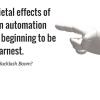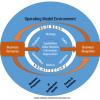Business Transformation Requires Transformational Leaders
Leadership and teaming skills are front and center in times of rapid change. Meet today’s constant disruption head on with expert guidance in leadership, business strategy, transformation, and innovation. Whether the disruption du jour is a digitally-driven upending of traditional business models, the pandemic-driven end to business as usual, or the change-driven challenge of staffing that meets your transformation plans — you’ll be prepared with cutting edge techniques and expert knowledge that enable strategic leadership.
Subscribe to Arthur D. Little's Culture & Leadership Newsletter
Insight
The Coming Backlash Boom?
The societal effects of AI-driven automation and the like are just beginning to be felt in earnest. The one thing that seems to be certain: over the next decades, companies and countries should be preparing for more political risk and uncertainty, and revamp their enterprise risk management approaches accordingly.
With EA, organization leaders can more readily improve the effectiveness, efficiency, and responsiveness of their enterprise. Effective EA is the key to enabling the enterprise to address orders-of-magnitude increases in complexity and orders-of-magnitude increases in the rate of change.
Security Architecture and Design
From the design and development of individual applications to enterprise network architecture, our approach is to make security an integral part of the finished product, ensure it is cost-effective and acceptable to your employees, and that it differentiates your products from those of your competition.
There is significant potential value for companies of all sizes in reviewing their potential financial vulnerability in the case of a cyberattack, as well as determining whether purchasing (or increasing their) cyber insurance could provide the protection to keep them in business.
Business architecture provides a holistic business perspective of a business ecosystem based on a clearly defined, time-tested framework. Core business architecture domains include capabilities, value streams, information, and organization. The extended view of business architecture includes strategies and policies that drive actions and investments, external and internal stakeholders that receive and participate in value delivery, the products and services a business delivers, the initiatives in which a business invests, and the metrics that enable business performance management.
As has been our tradition for the last several years, we've compiled the five most intriguing articles published by the Business Technology & Digital Transformation Strategies practice this year for today's Advisor. How did we come up with this list? We chose the articles that garnered the most feedback from Cutter Members and clients and those that created controversy among Cutter Senior Consultants and Fellows.
In this Advisor, the author explores how cognitive technology can be used “in the small” with benefit today as potential users wait for it to scale for use “in the large.” The author shares three operational scenarios to show how firms could build tools to put cognitive computing techniques to work today.
Engaging enterprise architecture (EA) in the acquisition process allows the acquisition team to plan, execute, and evaluate acquisitions within a strategic planning framework that improves acquisition performance without compromising organizational performance.
















